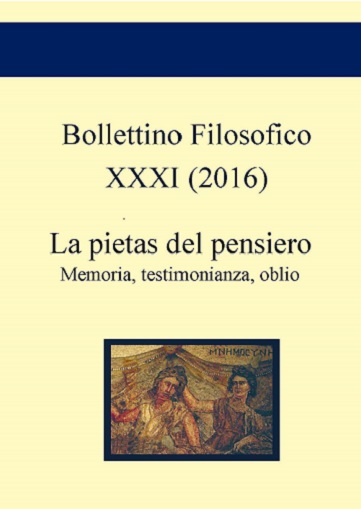Lo que no está escrito
Abstract
In order to be a witness, it is necessary to speak. To say not just any word, but a “minor” word, in the manner of Deleuze, one which deterritorializates, one which stands on its own, as Gadamer says, one which speaks truth. That word, which for many is the poetic word, necessarily becomes a political word, and it needs to be delivered from “outside the palace”, according to Pasolini, in the outskirts of power. Such are the words of Agamben —which know of nacked lives—, of Pasolini —which recognize the lights of resistance of the fireflies—, ambiguous words of Herta Müller, and the decolonial ones of Césaire. All of them call to not forget the existence of a inclusive exclusion in our societies, and in the end, of an Auschwitz before and after Auschwitz. Speaking in the manner of liberated Theseus or contemporary Zarathustras, they point to an sphere of resistance, of sacredness, and they summon us to a kind of community, that of the friends of solitude, as Derrida would say, where dwells the memory of barbarians, strangers, and fireflies.Downloads
Bollettino Filosofico pubblica in internet, ad accesso aperto, con licenza:
|
|
CCPL Creative Commons Attribution |
L'autore conserva il copyright sul suo contributo, consentendo tuttavia a chiunque "di riprodurre, distribuire, comunicare al pubblico, esporre in pubblico, rappresentare, eseguire e recitare l'opera", purché siano correttamente citati l'autore e il titolo della rivista. L’autore, al momento della proposta di pubblicazione, è inoltre tenuto a dichiarare che il contenuto e l’organizzazione dell’opera è originale e non compromette in alcun modo i diritti di terzi, né gli obblighi connessi alla salvaguardia di diritti morali ed economici di altri autori o di altri aventi diritto, sia per testi, immagini, foto, tabelle, sia per altre parti di cui il contributo può essere composto. L’autore dichiara altresì di essere a conoscenza delle sanzioni previste dal codice penale e dalle leggi speciali per l’ipotesi di falsità in atti ed uso di atti falsi, e che pertanto Bollettino Filosofico è esente da qualsiasi responsabilità di qualsivoglia natura, civile, amministrativa o penale, e sarà dall'autore tenuta indenne da qualsiasi richiesta o rivendicazione da parte di terzi.
